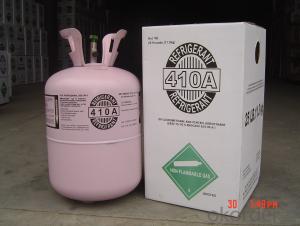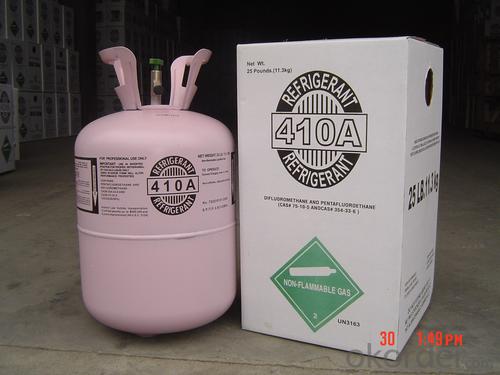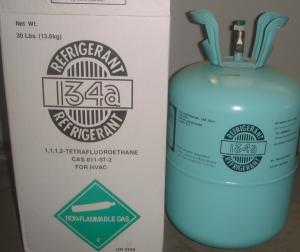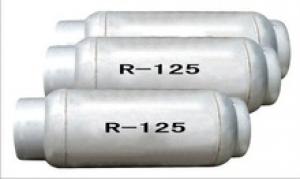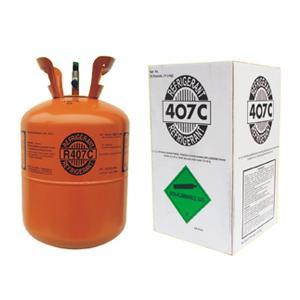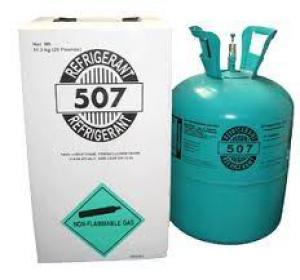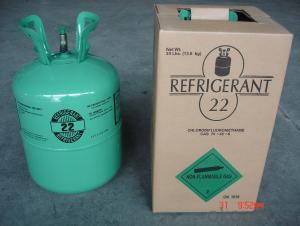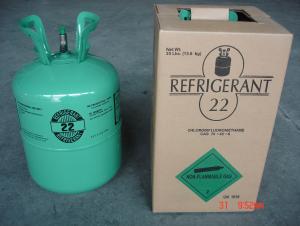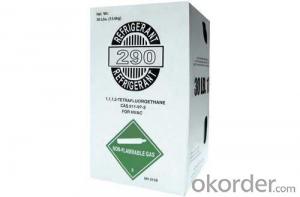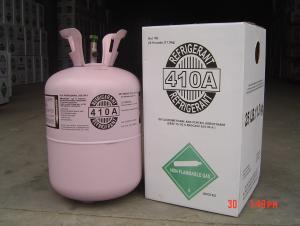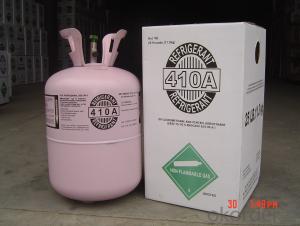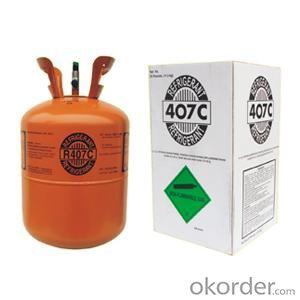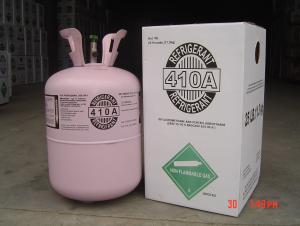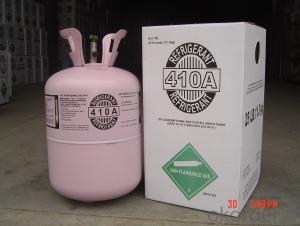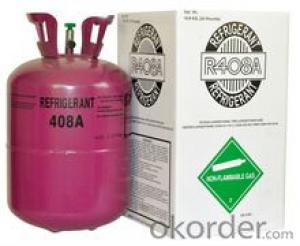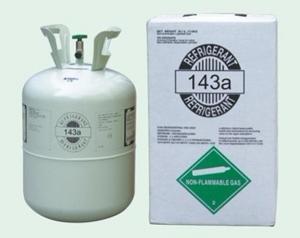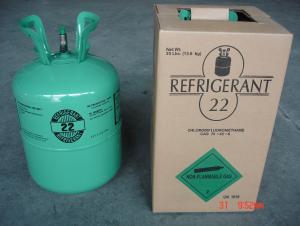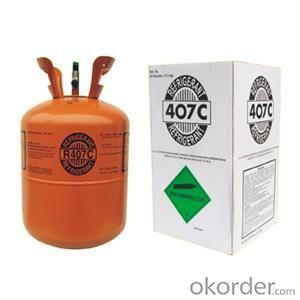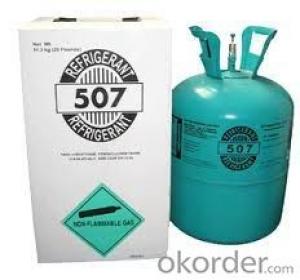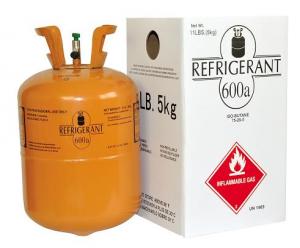Refrigerant R410a in 25LB
- Loading Port:
- Shanghai
- Payment Terms:
- TT OR LC
- Min Order Qty:
- -
- Supply Capability:
- 1000MT m.t./month
OKorder Service Pledge
OKorder Financial Service
You Might Also Like
Specifications
1. net weight: 800g
2. 1L strong cylinder
3. purity>99.9%
Physical Properties
Molecular Weight 72.58
Boiling Point at 1 atm (101.3 kPa) -52.7°C
Critical Temperature 72.5°C
Critical Pressure 4964.2 kPa
Critical Density 0.500 g/cm3
Liquid Density at 30°C 1038.2 kg/m3
Liquid Heat Capacity at 30°C 1.78 kJ/(kg•°C)
Vapor Heat Capacity at Constant Pressure
at 30°C and 1 atm (101.3 kPa) 0.85 kJ/(kg•°C)
Heat of Vaporization at Boiling Point 256.7 kJ/kg
ODP 0
GWP 0.29
Packaging and Storage
R-410A is available in disposable steel cylinders (11.3kg/30lb), returnable steel cylinders (800kg/926L). The filling ratio is not more than 0.87kg/L.
Cylinders should be stored in cool, dry and well-ventilated area away from sunlight and rain.
- Q: Is carbon monoxide an organic gas?
- Carbon dioxide is highly toxic. It is a strong ability to combine blood hemoglobin, which leads to cell hypoxia and suffocation. At present, if the trace carbon monoxide environment work, do not wear a gas mask and other necessary, it is recommended to eat more iron and calcium foods to reduce the harm to the body.
- Q: What does organic and inorganic mean?
- [Inorganic] inorganic is inorganic compounds referred to, usually refers to non-carbon compounds. A small number of carbon-containing compounds, such as carbon monoxide, carbon dioxide, carbonates, cyanides, etc. are also inorganic. Inorganic materials can be divided into oxides, acids, alkalis, salts and so on. Organic compounds Definitions Organic compounds usually refer to carbon-containing compounds, or hydrocarbons, and their derivatives, are collectively referred to as organic compounds.
- Q: Simply talk about hydrocarbons
- Hydrocarbon is a hydrocarbon compound. The organic compound consisting only of carbon and hydrogen is called a hydrocarbon and a hydrocarbon, which reacts with chlorine, bromine vapor, oxygen, etc. to produce a hydrocarbon derivative, Hydrocarbons (and benzene) do not react with strong acids, strong bases, strong oxidants (eg potassium permanganate), but unsaturated hydrocarbons (olefins, alkynes, benzene homologues) can be oxidized or react with hydrogen halide The
- Q: Compare the difference between London smoke and Los Angeles photochemical smog
- Los Angeles photochemical smog nitrogen content and hydrocarbons and derivatives more, mainly close to the car exhaust. Foggy London situation related to coal, soot solid particles and sulfur oxide more. Foggy London is more bleak, and Los Angeles is more toxic.
- Q: Organic organic compounds are organic matter?
- Your teacher said, "organic polymer compounds are a mixture," this sentence itself is contradictory ... ... compounds are mixed? The He was wrong it 囧,
- Q: High school chemical hydrocarbons with hydrocarbon derivatives with water solubility, density for accurate and comprehensive summary, thank you. Out of college entrance examination
- Hydrocarbons are insoluble in water and have a lower density than water
- Q: Hydrocarbons and hydrocarbon derivatives are not all non-electrolytes
- Hydrocarbons are, derivatives are not necessarily, such as organic acids (formic acid, acetic acid, etc.)
- Q: What are the inorganic compounds
- Hydrocarbons and their derivatives.
- Q: Is the oxygen derivative of the hydrocarbon a non-methane total hydrocarbon?
- Since it is a hydrocarbon, it is bound to be a hydrocarbon, and the oxygen derivative of the hydrocarbon is not a hydrocarbon! Therefore, even if the oxygen-containing derivative is volatile again, it is not a non-methane total hydrocarbon
- Q: Inorganic chemistry employment direction? Current research direction
- Inorganic chemistry is the science of the composition, nature, structure and reaction of inorganic matter, which is the oldest branch of chemistry. Inorganic substances include all chemical elements and their compounds, except for most of the carbon compounds. (In addition to carbon dioxide, carbon monoxide, carbon disulfide, carbonates and other simple carbon compounds are still inorganic substances, the rest are organic matter.)
Send your message to us
Refrigerant R410a in 25LB
- Loading Port:
- Shanghai
- Payment Terms:
- TT OR LC
- Min Order Qty:
- -
- Supply Capability:
- 1000MT m.t./month
OKorder Service Pledge
OKorder Financial Service
Similar products
Hot products
Hot Searches
